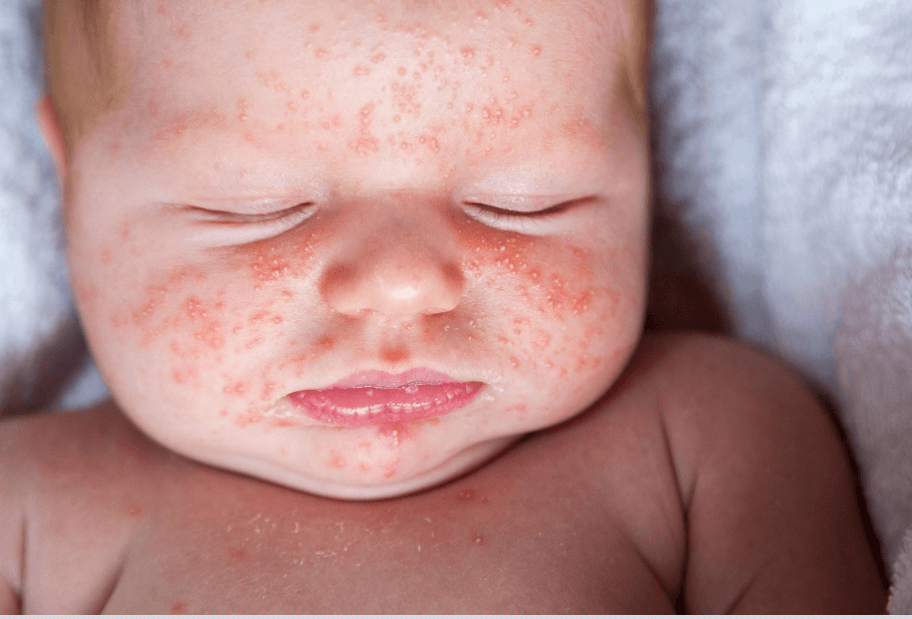My baby has a rash
Rashes are common in newborns and babies. Most rashes are harmless and go away on their own. You may notice that your baby’s skin is dry or peeling in the first 1-2 weeks of life and this is normal.
A common rash seen in babies in the first 3-4 days of life is erythema toxicum. Babies with this type of rash are well in themselves. They have a red blotchy rash that can come and go and often appears on the face, body, upper arms and thighs. This rash does not require any treatment and will go away on its own.
Erythema toxicum:

Information and pictures of other common skin rashes in babies can be found here.
In the first 3 months of life, if your baby has a rash and other symptoms, they may need to be reviewed by a medical professional. Please see below for things to look out for.
When should you worry?
If your child has any of the following:
- A rash that does not disappear with pressure (see the “Glass Test”)
- Becomes pale, mottled or abnormally cold to touch
- Becomes stiff for a prolonged period or has rhythmic, jerky movements of arms or legs that does not stop when you touch it (a fit/seizure)
- Becomes extremely agitated (crying inconsolably despite distraction)
- Becomes floppy or very lethargic (difficult to wake)
- Is going blue around the lips
- Has difficulty breathing
- Is under 3 months of age with a temperature of 38°C / 100.4°F or above (unless fever in the 48 hours following vaccinations and no other red or amber features)
You need urgent help
Go to the nearest Hospital Emergency (A&E) Department or phone 999
If your child has any of the following:
- Has a rash that looks like small blisters or fluid filled spots
- Has broken skin and the surrounding area becomes warm to touch or red. Look out for redness around the base of the umbilicus (belly button) in the first few weeks of life
- Nappy rash that isn’t getting better with simple measures such as regular nappy changes or barrier creams
- Is 3-6 months of age with a temperature of 39°C / 102.2°F or above (but fever is common in babies up to 2 days after they receive vaccinations)
- Continues to have a fever of 38.0°C / 100.4°F or more for more than 5 days
- Becoming increasingly sleepy and not consistently waking for feeds
- No wet nappies in the last 8 hours
- Has a dry mouth or sunken fontanelle (soft spot on the head)
- Is getting worse or you are worried
You need to contact a doctor or nurse today
Please ring your GP surgery or call NHS 111 - dial 111
If symptoms persist for 4 hours or more and you have not been able to speak to either a member of staff from your GP practice or to NHS 111 staff, then consider taking them to your nearest ED
None of the above features are present
- It is common for newborns to develop blotchy red skin at 2 to 3 days old. This is a normal newborn rash and shouldn’t bother your baby. It clears after a few days
- Closely monitor your baby for any signs of deterioration by looking out for any red or amber features
- Additional advice is also available for families to help cope with crying in otherwise well babies – click here
Self care
Continue providing your child’s care at home. If you are still concerned about your child contact your Health Visitor or call NHS 111 – dial 111
For wear and tear, minor trips and everything in between.
Self-care
You can treat your child's very minor illnesses and injuries at home.
Some illnesses can be treated in your own home with support and advice from the services listed when required, using the recommended medicines and getting plenty of rest.
Sound advice
Children can recover from illness quickly but also can become more poorly quickly; it is important to seek further advice if a child's condition gets worse.
For information on common childhood illnesses go to What is wrong with my child?
Health visitors are nurses or midwives who are passionate about promoting healthy lifestyles and preventing illness through the delivery of the Healthy Child Programme. They work with you through your pregnancy up until your child is ready to start school.
Health Visitors can also make referrals for you to other health professionals for example hearing or vision concerns or to the Community Paediatricians or to the child and adolescent mental health services.
Contact them by phoning your Health Visitor Team or local Children’s Centre.
Sound advice
Health visitors also provide advice, support and guidance in caring for your child, including:
- Breastfeeding, weaning and healthy eating
- Exercise, hygiene and safety
- Your child’s growth and development
- Emotional health and wellbeing, including postnatal depression
- Safety in the home
- Stopping smoking
- Contraception and sexual health
- Sleep and behaviour management (including temper tantrums!)
- Toilet training
- Minor illnesses
For more information watch the video: What does a health visitor do?



